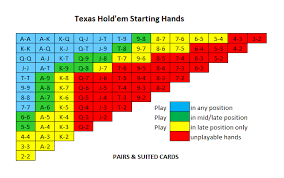Odds Of Making A Hand In Texas Holdem

Odds Of Making A Flush In Texas Holdem
Texas Holdem Poker Two Card Hand Frequencies. Both before and after the flop in any limit Holdem game, it is helpful to be able to make a reasonably accurate estimate of the types and numbers of playable hands that you are likely to be competing against. Playing poker is about playing the odds. The following list gives the odds for outcomes in Texas Hold’em hands. When you realize how heavily the odds are stacked against you, you may want to rethink going all-in before the flop with two suited cards. Use the odds to your advantage: 1 percent (1-in-100): Percentage of.
- Probability of making a specific hand (7 out of 52) The following chart shows the probability of getting a certain hand. Whereas a pair floats by often enough, getting a straight or royal flush is less likely. 7 out of 52 means, that although you build your hand using 5 cards, you still have 7 cards from which to choose these 5.
- Texas Hold'em Odds 'Outs' are unseen cards that will make any hand you expect will win the pot if they come off on the turn or river. There are 47 unseen cards on the flop. To determine your odds of making your hand, you divide your number of outs by the remaining unseen cards (that will not help your hand). An outside straight draw has 8 outs.
- Suddenly you are risking $100 to win $200 and the odds are 200-100, or simplified, 2-1. Since you’re only 6-1 to make your hand you should probably fold. Of course pot odds are just a guideline and you’re totally in your right to make a crazy call because you are a 100% certain your opponent has specific hand.


Both before and after the flop in any limit Holdem game, it is helpful to be able to make a reasonably accurate estimate of the types and numbers of playable hands that you are likely to be competing against.
Much of your decision making involves the business of 'putting' opposing players 'on their hands' (or in other words, figuring out what cards they are playing). Experienced Holdem players are often very good at this. An understanding of the types of hands that are most likely to be against you helps prevent both underestimating and overestimating your competition.
Odds Of Getting A Flush In Texas Holdem
Here are some stats that are based on the total possible combinations of various Holdem hole cards that are normally playable.

For better viewing on your mobile device (or to download or print the chart), check out holdem hole card frequencies in high resolution universal .pdf format.
The five different types of two card Hold'em hands highlighted here are those that are most commonly played. They are not shown in any particular order and within the groups are powerful hands that are almost always played, down to marginal value hands that can be played under certain betting conditions.
The rest of the hands, shown as All Others, are all the very weak hands that most players hardly ever play.

Pairs - All pairs. AA, KK, QQ, JJ, 1010, 99, 88, 77, 66, 55, 44, 33, 22
Two High Cards Suited - AK(S), AQ(S), AJ(S), A10(S), KQ(S), KJ(S), K10(S), QJ(S), Q10(S), J10(S)
Two High Cards Unsuited - AK, AQ, AJ, A10, KQ, KJ, K10, QJ, Q10, J10
Medium and Low Suited Connectors - These include both no-gap and one-gap connectors: J9(S), 109(S), 108(S), 98(S), 97(S), 87(S), 86(S), 76(S), 75(S), 65(S), 64(S), 54(S), 53(S)
Ace and Non-High Combinations - A9, A8, A7,A6 Note: 25% of these 64 combinations (16) are suited. 75% of the 64 combinations (48) are unsuited.
Playing poker is about playing the odds. The following list gives the odds for outcomes in Texas Hold’em hands. When you realize how heavily the odds are stacked against you, you may want to rethink going all-in before the flop with two suited cards. Use the odds to your advantage:
1 percent (1-in-100): Percentage of time that no player holds an Ace or a King at a table in a 10-handed game
1 percent (1-in-100): Percentage of time that if you hold two suited cards, you’ll flop a flush
6 percent (about 1-in-20): Percentage of time that five community cards will give pocket suited cards a flush
6 percent (about 1-in-20): Percentage of time that you’ll be dealt a pocket pair
8 percent (about 1-in-12): Percentage of time that you’ll hit at least trips after having a pair on the flop
12 percent (about 1-in-8): Percentage of time that you’ll flop trips if holding a pocket pair
12 percent (about 1-in-8): Percentage of time that two more cards will flop in the same suit as a suited pocket pair
19 percent (about 1-in-5): Percentage of time that the five community cards will at least trip your pocket pair
32 percent (about 1-in-3): Percentage of time that you’ll pair one of your cards on the flop (with no pocket pair)
33 percent (about 1-in-3): Percentage of time that you’ll make a full house or better after having trips on the flop
35 percent (about 1-in-3): Percentage of time that you’ll make a flush on the turn or river if you have four cards to a flush after the flop